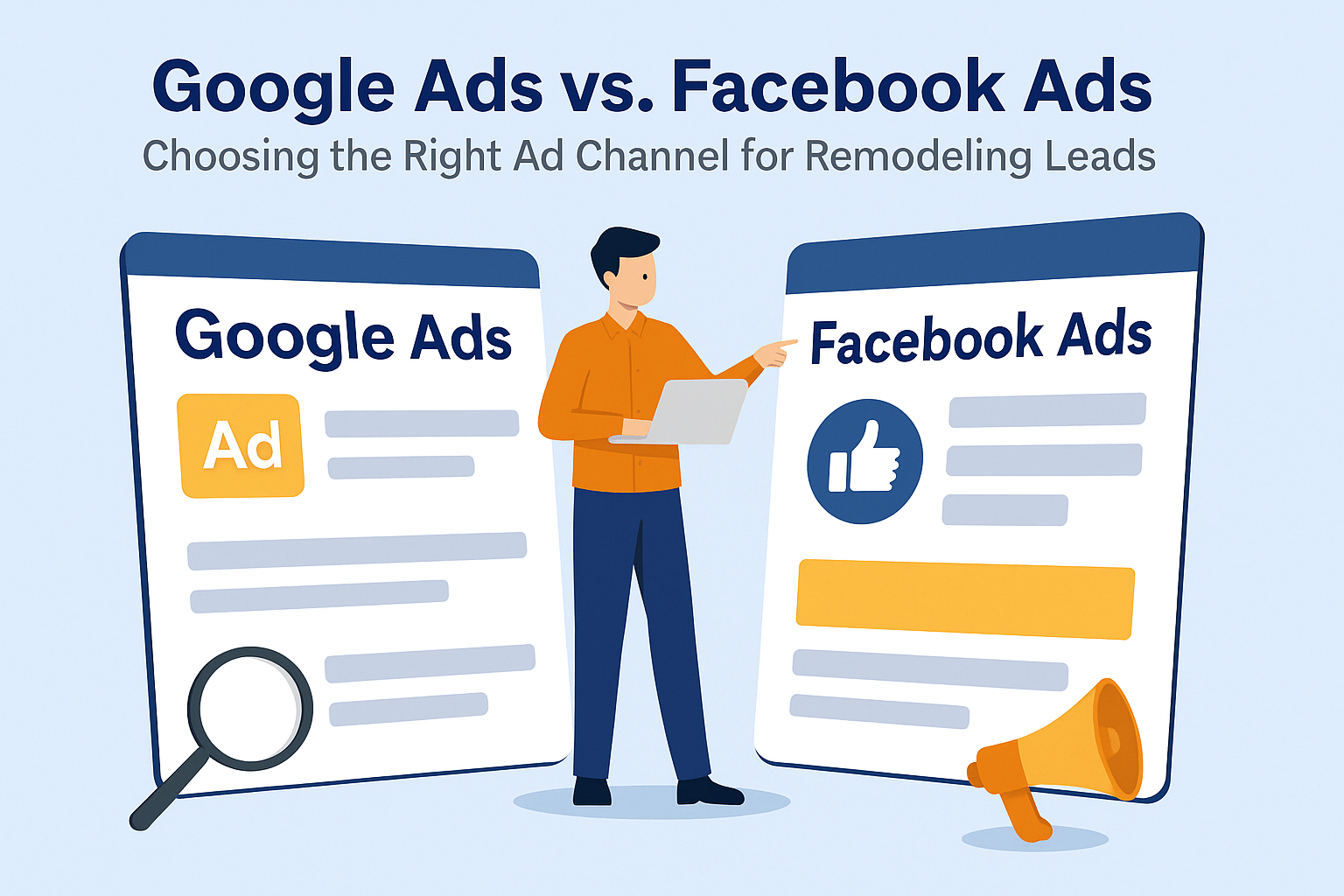The home remodeling industry persists to thrive, as demonstrated by the $603 billion expenses of Americans who renovated their homes in 2024. With this demand, home service providers have gained tremendous opportunities for growth, but only if they manage to generate home improvement leads online consistently.
However, several competitors offer comparable services. If your home remodeling business is not showing up when and where potential leads and clients are searching, you are missing out on opportunities. To gain an edge, one solution is utilizing digital advertising via Google Ads and Facebook Ads, the two tech giants in the pay-per-click (PPC) platform.
The Nature of Google Ads
If someone searches “kitchen remodeler in Santa Monica, CA,” your ad can emerge at the top of the page above organic results. This is how Google Ads works.
Formerly known as AdWords, Google Ads publicizes business advertisements, product listings, and service offerings. It also enables your site to appear in search results or on other non-search websites when users type a related keyword.
Further, its high-intent context is helpful in capturing leads who are actively searching for your service. It also leverages keyword targeting and uses reliable conversion tracking to obtain visibility, increase traffic, and attract exclusive remodeling leads to turn them into potential clients.
Pros:
- High Audience Intent. It helps you to reach users who are searching for remodeling solutions faster, as it mainly targets warm leads.
- Keyword Targeting. Google Ads bid on strong keywords that may be used to reach quality prospects.
- Better Conversion Tracking. It works well with Google Analytics; hence, you gain clear performance insights.
- Quick Results. Running Google Ads only bears a short amount of time. Once the campaign is optimized, you can immediately see lead inquiries within days or hours.
- Local targeting. Google allows you to focus on specific service areas, which is ideal for remodeling firms with a defined location.
- Flexible Ad Budgets. With cost-per-click (CPC) payment, you only spend when someone sees your service offering and is directed to your landing page.
Cons:
- High Competition. Multiple businesses bidding on the exact keywords drive up costs, making standing out harder. This may push your ads down the search results.
- Short-Term Investment. Running your Google Ads will halt as soon as your funding is spent, restricting the boost of your business site organically.
- Intricate Setup and Maintenance. Without regular optimization and testing, your campaigns can become ineffective.
- Limited Creativity. Google Ads does not support interactive formats and is limited to static texts and visuals.
The Role of Facebook Ads
Facebook Ads is another powerhouse PPC platform that lets you advertise across social media, particularly within the Meta suite of products. Its ads may be in diverse formats, like images, videos, or reels, targeting distinct audiences.
Unlike Google Ads, where users are busily searching, Facebook Ads emphasize interest-based marketing. They display ads based on user interests, behaviors, and demographics, making them ideal for brand awareness and generating better remodeling leads.
Pros:
- Heightened Engagement. Facebook is a powerful advertising medium with more than 3.06 billion active users monthly. This means that the ad could efficiently reach users with similar interests who are browsing on Facebook.
- Highly Visual Platform. Facebook Ads can showcase your work with interactive visuals, which could entertain users.
- Lower CPC. You often pay less per click, especially when targeting colder audiences or running brand awareness campaigns.
- Great for Remarketing. Facebook Ads retarget people who visited your remodeling business site or previously engaged with your content.
- Detailed Analytics. Facebook delivers insights that allow you to track your ad performance to help you optimize campaigns.
Cons:
- Lower Purchase Intent. Facebook ads are discover-based. Users don’t usually come to Facebook looking for a remodeler, so lead conversion is more complex.
- Creative Fatigue. Not all users engage with frequently shown ads. Thus, you need engaging content and constant testing to maintain performance.
- Longer Conversion Cycle. Because leads are often in the early discovery stage, it might take more nurturing before they’re willing to hire.
- Declining Organic Reach. Facebook ads will not show your content organically unless you are paying, affecting your presence on the platform.
Google Ads vs. Facebook Ads: Selecting the Best Advertising Platform
Google Ads is an adequate choice if you like to gain remodeling leads from homeowners who are seeking assistance and ready to purchase. Therefore, it is helpful for home service providers with local businesses, professional services, or e-commerce shops.
Meanwhile, if you want to increase brand awareness, Facebook Ads are what you need. This PPC ad is valid when building a community around your brand and targeting demographics to boost quality leads in the future.
Generally, both Google Ads and Facebook Ads contribute immense value. However, employing both is important to achieve a more extensive promotion strategy. Google Ads can capture hot leads, while Facebook can tap colder audiences and bring them closer to your pipeline to convert.
Upgrade Your Lead Generation with the Right Advertising Model
Today, home remodeling enterprises need a more innovative approach than referrals to gain and convert leads consistently. If you are considering whether to use Google Ads or Facebook Ads, it is necessary to understand their edges. These will help you assess whether investing in PPC is worth the risk.
At HomeGuru Leads, we are a lead generation agency for home service providers to generate leads via digital marketing tactics like paid ads, search engine optimization, content marketing, and more.
Ready to grow your remodeling leads and clients? Reach out to HomeGuru Leads today to get started!


